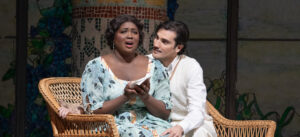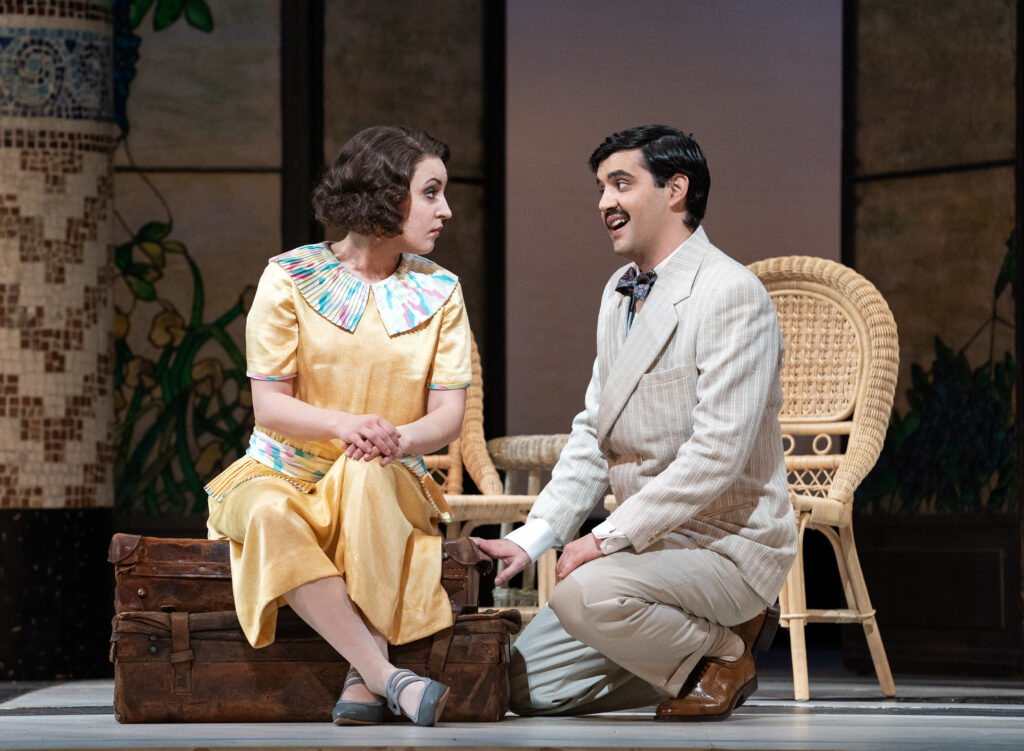
Metropolitan Opera 2023-24 Review: La Rondine
Emily Pogorelc & Bekhzod Davronov Debut at the Met to Rousing Results While Jonathan Tetelman Shows Promise
By Francisco SalazarIt’s been 10 years since Puccini’s “La Rondine” has been performed at the Metropolitan Opera. The work is a light Puccini opera that is sometimes compared to an operetta and has been performed a total of 34 times at the famed house. In the past, it has often been brought to the company at the behest of a Diva who is interested in portraying the eponymous Magda and on this occasion it was no different. But this occasion was also built on the debut of a major tenor and two other important house debuts.
The result was a mixed bag.
A Dynamic Couple
Before I get to the less favorable parts of the evening, two debuts astonished in every way imaginable. As the couple of Lisette and Prunier, soprano Emily Pogorelc and tenor Bekhzod Davronov both filled the stage with a breath of fresh air. Pogorelc brought a fantastic lyric coloratura voice to the role of Lisette and while she doesn’t get an aria, her interactions with the other characters showcased a bright and crystalline voice. It didn’t hurt that her movement around the stage was filled with great flexibility and charisma and that she lit up the stage every time she entered. Meanwhile, Davronov, who started a bit hesitant in his first lines, eventually brought a gorgeous ardent tenor, especially as he sang the first lines of “Chi bel sogno di Doretta.”
The chemistry between the two was also quite impressive, especially in their Act one duet during which they flirted over Lisette’s attire. Their Act three duet was also charming as Pogorelc and Davronov sang with ease over the melodic Puccini orchestra. The two sang with gorgeous legato phrases, as well as very articulated staccato lines that enhanced the lively quarrel between the two. There was even a moment where Davronov sang a ringing High C.

Karen Almond / Met Opera
Strong Support
The ensemble was also strong led by Alfred Walker in the role of Rambaldo. His voice was imposing and his presence exuded power. The roles of Ivette, Bianca, and Suzy were sung with charm by Magdalena Kuzma, Amanda Batista, and Sun-Ly Pierce. The piano solo was also played with delicacy by Katelan Tran Terrell.
The 20s don’t really roar
Nicholas Joel’s production, which premiered at the Met in 2008, was originally conceived for Angela Gheorghiu, a diva who was obsessed with beauty and tradition. There is no doubt that this production is exactly that. A traditional showcase that brings the setting of the opera from 1860 to the 1920s. Each set is inspired by the Art Deco period and decorated with mosaic columns that are at the forefront and give the impression of an immense set. They are gorgeous looking in every way and the audience seemed to appreciate it as they clapped each time the Met’s curtain came up.
But that was all that the set offered in this revival, a reminder that opera can still be opulent.
Everything else lacked energy. The first act saw singers sit in the same repetitive spots with little charisma or spontaneity. In the second act, the chorus was scattered in one place and never moved from their positions. When they did, they danced awkwardly. What was even more astonishing was that for a big crowd scene like the second act, it felt empty. More astonishing was the choreography, which saw dancers flipping and tossing in the air with little synchronicity to the music. The final act was even more barren, as it felt like the set was not taken advantage of by its four main soloists.
For a work that is filled with energetic numbers, this all felt underrehearsed.
Mixed Results
The biggest issue of the evening was the lack of chemistry between Angel Blue and Jonathan Tetelman. The two are supposed to fall in love in the opera and we, the audience are supposed to root for them. Yet in many moments, especially in Act Two, they barely looked at each other. The waltz was also awkward with both looking lost in the dance. This was the moment they were falling in love but it was hard to believe given that in the most romantic moments, both seemed more preoccupied with glancing toward the audience and avoiding eye contact with one another. This hurt the entire arc of the story. In the Act three final duet, which is a devastating and passionate plea for love, there was noticeable hesitance to even touch. You could sense they were moving about the scene in a very constrained manner. While the duo sang passionately, their movement was stilted. And it didn’t help that throughout the evening both seemed tentative with the blocking in general and preferred to remain in the same place throughout the acts.
Vocally both also had mixed results. Coming into the evening there was big anticipation for the debut of Tetelman, who has been making waves internationally and has become one of the most promising tenors of his generation. The tenor certainly has a voice that packs a punch with expressive singing and an incredibly fiery high register that resonates throughout the auditorium. In the final duet, “Ma come puoi lasciarmi” Tetelman shone with passionate phrasing and ardent high notes. He threw everything into this final moment and his Italian was immaculate as he repeated the lines “Non lasciarmi solo,” each expressing the pain in his Ruggero. His “Bevo al tuo fresco sorriso” was also filled with expressive singing as his voice rode over the orchestra and ensemble and exuded youthful energy.
However, in his two solo arias, the sound wasn’t always warm and resonant. His first, “Parigi! È la città dei desideri,” which is mostly in the middle voice, sounded tentative and the middle of his register seemed to obtain a grainy sound. That being said it was his entrance aria and Tetelman was just warming up in what was a high-stakes debut. Once he climbed into his high register, you could sense that Tetelman was comfortable and he did end the aria with a heroic high note that earned him an ovation. In Act three “Dimmi che vuoi seguirmi,” Tetelman showcased a warmer sound with connected legato lines. However, there were some pitch issues, disconnected lower notes, and while he attempted to give the aria some rubati, the orchestra didn’t support him in the least.
In the title role, Angel Blue was making her role debut as Magda. Over the years, the voice has obtained a heavier quality that showcases a full-blown sound that is riveting. But it comes at the expense of softer and floating notes. In her first aria “Chi bel sogno di Doretta,” Blue sang with a gorgeous full voice that saw her high Cs shine but lacked subtlety or nuance in the phrases. In the second aria, “Ore dolci e divine,” Blue was able to bring out the sweeter qualities of the voice and held back the tone, allowing us to see the playfulness of her Magda. That said, she did have a harder time scaling back the higher notes and floating to more a piano sound.
In Act two, Blue’s finest moments came at the end of the Act in her small but crucial monologue as she has mixed feelings about finding true love and leaving her life with Rambaldo. Here, Blue played to her greatest strengths, which are her dramatic vocal powers. In Act three, her final duet with Tetelman saw the soprano once again bring out her full voice with the sound piercing through the auditorium. However, her voice did not match well with Tetelman’s and in her final moments, “Quando sarai guarito, te ne ricorderai,” Blue lost some of the lushness of her voice as she attempted singing with more piano sound. The result was the soprano falling back on a fuller voice. The final “Ah!” also saw the soprano pulling back the sound but obtaining an unsteady note.
In the pit, Speranza Scappucci conducted with precision and direction. The orchestra’s brightness was there but there seemed to be a lack of nuance. The ebb and flow of Puccini’s music that singers use to embellish their arias with rubati also seemed to be missing. This was particularly noticeable in the final duet where Tetelman and Blue seemed to be stretching their phrases but didn’t have much room to do so. In a way, Scappucci’s directness works better for the music of Verdi or Donizetti as she is able to keep things fluid. Another issue with the night was the balance. Many times especially in the second-act ensembles, the orchestra overpowered the singers. That said, the Italianate bright colors that Scapucci emphasizes in the score, and are so often lacking in the hands of other conductors, are a welcome return to the Met.
In all, this performance suggested that this run is very much a work-in-progress that will hopefully get better as the singers settle into subsequent performances.


